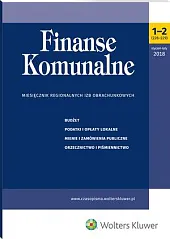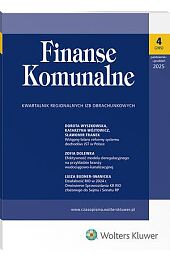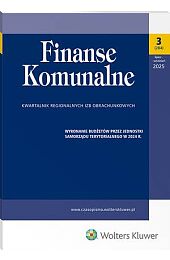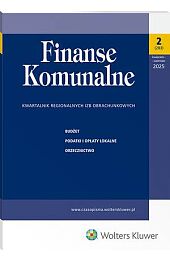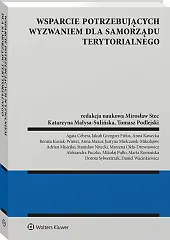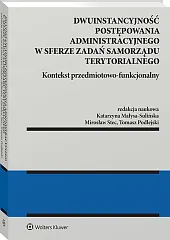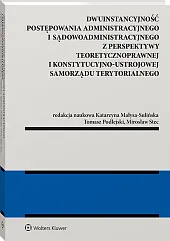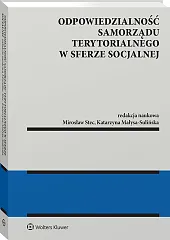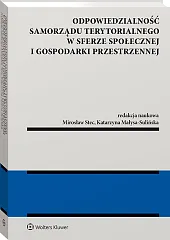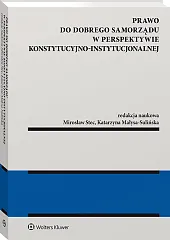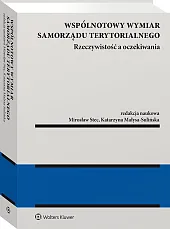ARTICLES
Wojciech Robaczyński, Zbigniew Zieliński
p. 5
Jędrzej Bujny, Mikołaj Maśliński
p. 23
BUDGET
Ireneusz Kołakowski
p. 41
Marcin Kaliński, Radosław Kujawiński
p. 54
Mariusz Mizgała
p. 65
Joanna Radzieja
p. 78
Arkadiusz Talik, Kacper Pieczara
p. 88
LOCAL TAXES AND CHARGES
Beata Rogowska-Rajda, Tomasz Tratkiewicz
p. 100
PROPERTY AND PUBLIC PROCUREMENT
Rafał Cieślak
p. 122
Łukasz Węgrzynowski
p. 136
VARIA
Per Olav Nilsen
p. 144
INDEKS
Index of Authors of publications in “Local Authority Finance” in 2017
p. 154
Index of Contents of publications in “Local Authority Finance” in 2017
p. 155
Table of Contents & Abstracts
p. 79
Wojciech Robaczyński, Zbigniew Zieliński
Admissibility of a public fi nance sector unit to enter into a settlement in the light of the revised provisions of the Public Finance Act
The ability of a public fi nance sector unit to enter into a settlement has been raising certain doubts for a long time. They have encouraged the lawmakers to amend the Public Finance Act and the Act on Liability for Breaching Public Finance Discipline. The introduction of Article 54a into the Public Finance Act not only determines that public fi nance sector units may enter into settlements on civil law receivables, but, furthermore, in the justifi cation of the draft, the lawmakers explicitly encourage the rationalization of conduct and – if there are no grounds for this – the avoidance of handling disputes before the court regarding disputed receivables. In principle, the general criteria set out in this regulation deserve to be approved, although it cannot be ruled out that they will require modifi cation.
The justifi cation for introducing the amendments to the Act on Liability for Breaching Public Finance Discipline should be assessed by the desire to restrict the concerns of the people responsible for entering into and performing settlements. It should simultaneously be noted that the issue of a settlement in the public sector is multi-faceted and applies, among others, to the relationship between the settlement and the amendment to the public contract, as regulated in Article 144, para. 1 of the Public Procurement Law.
Back to top
Jędrzej Bujny, Mikołaj Maśliński
Prevention of odour nuisance in the light of the currently applicable law
Odour nuisances are one of the most common causes of complaints about air quality submitted to the Environmental Protection Inspection Authorities. Even so, there is currently no act of law which comprehensively deals with matters related to odour prevention. Therefore, this article describes the most important provisions of Polish and EU law that can be used to limit potential or actual odour nuisances. Furthermore, the Code of Odour Nuisance Prevention published by the Ministry of the Environment in September 2016 and the draft Act on Odour Nuisance Prevention of 2011 have been analysed. The objective of this paper is to assess the applicable regulations in the context of the forthcoming legislative work on the Act on this matter.
Back to top
Ireneusz Kołakowski
Drawing liabilities extending beyond the budget year (long-term) and the principle of the annual nature of the budget of local authority units in the context of a breach of public fi nance discipline
The paper presents selected aspects of assuming long-term liabilities in the context of the set budget plan. Reference is made, among others to the category of agreements which are required to ensure the continuity of operation of the entity and the instrument of long-term fi nancial planning in the form of the long-term fi nancial forecast, which, other than the forecasting standards, contains a directive component in the form of an authorization to assume liabilities. The respective considerations were supplemented with examples of judgements and the positions of the competent authorities assessing the correctness of activities when assuming liabilities extending beyond the budget year.
Back to top
Marcin Kaliński, Radosław Kujawiński
Financing government administration tasks in the light of the fi ndings of the Supreme Audit Offi ce of Poland and court case law
The objective of this article is to present issues related to the fi nancing of the tasks of the government administration and other tasks commissioned by law, in particular those performed by local authority units, in the light of the results of audits conducted by the Supreme Audit Offi ce and on the basis of court case law. The Act on Income of Local Authority Units indicates that a special purpose grant is awarded for these tasks assuring the full and punctual performance of commissioned tasks. As the audit results show, local authority units do not always receive co-funding from the state budget at a level which is adequate to the tasks performed, which itself constitutes grounds for seeking claims from this in court proceedings. Therefore, regardless of the outcome of the court proceedings, the related outlays are charged to public fi nance and result in activities of public authorities focusing on matters which are not directly related to satisfying the collective needs of the citizens. In the opinion of the authors of the article, this indicates signifi cant dysfunctionality in the currently applicable model of fi nancing of the tasks of government administration and the need to develop new system solutions on this. Based primarily on the results of the audits of the Supreme Audit Offi ce, proposals have been presented which involve the conversion of commissioned government administration tasks into the own tasks of local authority units.
Back to top
Mariusz Mizgała
Selected aspects of a breach of public fi nance with regard to the fi nancial plan of a local authority hospital
Public authority tasks related to the functioning of the healthcare system implemented by hospitals operated in the form of independent public healthcare institutions (SPZOZ), as well as budget units, are encompassed by the same regime of legal standards protecting public fi nance governance. Apart from the non-budget fi nancial support from health insurance contributions, the fi nancial management of the SPZOZ is based on a fi nancial plan, like other public fi nance sector entities. The specifi c nature of treatment activities, at the source of which is the constitutional obligation to assure equal access to healthcare, in comparison with the current public healthcare problems, does not release the managers of hospitals from applying the regulatory rules of fi nancial planning, as a basic tool of maintaining public fi nance governance
Back to top
Joanna Radzieja
Performance of expenditure from the budget of the local authority unit – eligibility of irregularities in the light of public fi nance discipline
The objective of this paper is to present issues regarding irregularities in the performance of budget expenditure from the budget of a local authority unit in the context of a breach of public fi nance discipline. Conduct, which is subject to penalization under Article 11 of the Act on Liability for Breaching Public Finance Discipline, has been described.
Back to top
Arkadiusz Talik, Kacper Pieczara
Breach of public fi nance discipline related to the reporting of public fi nance sector units
This paper addresses issues related to the breach of public fi nance discipline in connection with the reporting of public fi nance sector units. The authors present both the general characteristics and the types of fi nancial reports, as well as potential forms of breach related to this matter. This paper is also partially devoted to an analysis of the principles of determining and investigating liability for fi nancial delicts (torts) of this type, as well as possible circumstances disabling such liability.
Back to top
Beata Rogowska-Rajda, Tomasz Tratkiewicz
Rules for the adjustment by local authority units of the preliminary deduction in VAT in the light of EU legislation and their Polish implementing regulations
The system of adjusting input tax is an integral part of the system of deducting VAT. Since the preliminary deduction (conditional on an action at the time of purchase as a taxpayer) is only based on the taxpayer’s intention to use goods or services that were purchased for conducting activities that are taxable with VAT, its subsequent verifi cation is required in accordance with the actual use of the goods purchased and possibly making corrections. The emergence of the obligation to make a correction and the rules for making it depend on its reason, the method of use of the goods purchased and their nature. While the obligation to make an adjustment in the “typical” business activities of commercial entities will appear occasionally, as a rule, the activities of local authority units – being of a unique nature – will be of a continuous nature, appearing in various contexts and confi gurations.
This article attempts to specify and put order to the principles of local authority units initially deducting input VAT, taking into account EU law and the case law of the Court of Justice of the European Union, as well as national regulations.
Back to top
Rafał Cieślak
Concession for works or services – new acts breaching public fi nance discipline
The new Act on the Concession Contract for Works or Services introduced important changes to the legislation on liability for a breach of public fi nance discipline. As a result, the list of activities constituting a breach of discipline has been signifi cantly increased. Attention is drawn to the signifi cant approximation of the rules on the conclusion of concessions contracts to the public procurement system. On the other hand, the principle of the contracting entity’s freedom to organize concession proceedings, demonstrating signifi cant fl exibility in the preparation of such procedures, raises certain interpretation doubts. The objective of this article is to discuss the new legal solutions on this.
Back to top
Łukasz Węgrzynowski
Representation of the State Treasury by a proxy appointed by the head of county when giving notice of termination of the level of the annual perpetual usufruct charge
The issue of representation of the State Treasury by a proxy appointed by the head of county the State Treasury in matters regarding the annual charge for perpetual usufruct deserves attention for practical reasons. The allegation of defective representation of the State Treasury in the legal activity of terminating the annual charge is willingly used in court disputes on the update of the charge. This issue is also interesting for theoretical reasons. The legal assessment requires a more detailed description of both the representation of the State Treasury and the nature of disputes regarding the update of the annual perpetual usufruct charge. It needs to be analysed in whole, taking into account the general assumptions on public representation.
Back to top
Per Olav Nilsen
Norwegian Local Government – System of Internal Supervision and Control and External Audit
The paper presents the Norwegian system of internal supervision and control, as well as external audit in local government. The authors introduce the subject by describing local government, its functions and sources of revenue, after which they discuss the organization and functions of supervision, internal control and external audits in local government. They present the main points of Chapter 12 of the Local Government Act of 2004, on internal supervision and control, as well as external auditing, explaining that the objectives of the Act are to improve the effi ciency and effectiveness of Norwegian local government. The authors conclude that these regulations constitute a sound basis for conducting supervision, control and audits in the best interests of the healthy development of Norwegian municipalities and counties, but add that, even so, they are insuffi cient, as politicians also need to demonstrate the will to fully utilize the tools offered by this legislation.
Back to top



